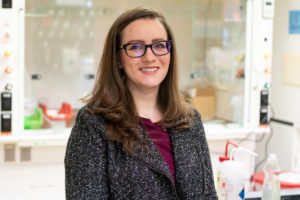Read Elizabeth’s Emerging Investigator article Antimicrobial efficacy of a nitric oxide-releasing ampicillin conjugate catheter lock solution on clinically-isolated antibiotic-resistant bacteria, DOI D3BM00775H.
Check out our interview with Dr Brisbois below:
How do you feel about Biomaterials Science as a place to publish research on this topic?
The Biomaterials Science journal is a premiere venue to publish the latest research investigations in designing novel biomaterials and studying their wide-ranging applications. It is an honor to publish here and keep the community updated with our latest work!
What aspect of your work are you most excited about at the moment and what do you find most challenging about your research?
Advanced biomaterials are sorely needed to promote biocompatible interfaces and to address a wide range of challenges associated with medical device applications in order to resist infection, prevent thrombosis, mitigate host responses, provide functional mechanical support, and support cellular attachment and proliferation. Achieving these attributes simultaneously requires materials that possess multiple functional mechanisms via precise control of the material design and therapeutic action. While we make technical advances in the biomaterials we are developing, our ultimate goal is to translate those materials/technologies to healthcare and medical devices. Developing new biomaterial technologies that solve these critical problems while also being commercially and clinically viable remains a challenge. However, if we are successful, these new materials we are studying will be applied to a wide range of medical devices that are critical to patient care, everything from small catheters and cannulas to large extracorporeal life support devices (e.g., ECMO, hemodialysis). Collaborating with a multidisciplinary team with expertise in basic science, engineering, clinical applications, and industry facilitates pushing these new material solutions from the benchtop to the bedside.
Can you share one piece of career-related advice or wisdom with other early career scientists?
The best piece of advice that I can give young researchers as they begin their scientific careers is to always find strong mentors at each stage of their training and career. As a student, mentors can be graduate students or postdocs who you look up to, as well as those who are more established in their career. Mentors should be people that you can learn from and emulate, reach out to for advice, and are successful in their field. Work to establish a network of mentors and always continue building your network of mentors throughout your career, both at your institution and externally. Having this support network is critical in helping you continue to grow professionally and reach your career goals. Meet with your mentors regularly. Reach out to them for advice and guidance. Keep them updated with your successes, no matter how big or small.
Keep up to date with all of Elizabeth’s work by checking out the Brisbois Lab website.











